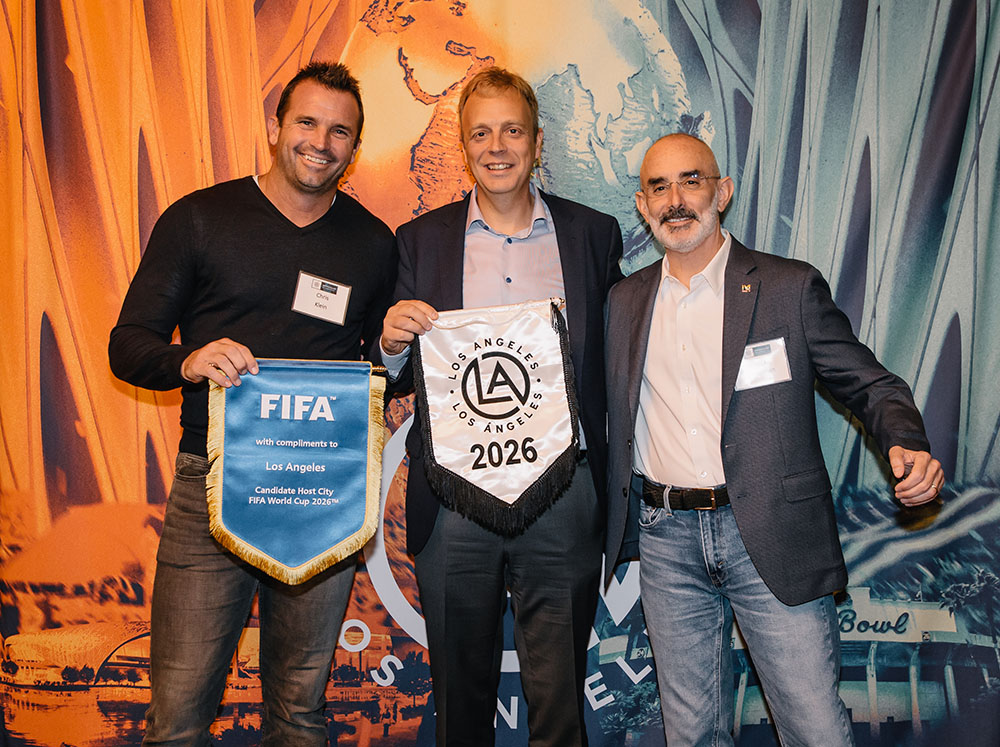
Los Angeles World Cup Host Committee Co-Chairs Chris Klein and Larry Freedman exchange a ceremonial banner with FIFA’s Chief Competitions and Events Officer, Colin Smith.
Courtesy of Los Angeles World Cup Host Committee

In early 2018, before the Los Angeles Football Club had participated in its first Major League Soccer match and Banc of California Stadium at Exposition Park had opened, the L.A. World Cup Host Committee began the process to campaign for its spot as a host city for the 2026 World Cup.
The international competition hosted by FIFA, the governing body of association football worldwide, happens every four years and attracts millions of fans around the world. North America (the United States, Canada and Mexico) was selected as the region for the 2026 games in a unique joint bid in June 2018, making this the first World Cup anchored by three co-hosts, with Canada and Mexico set to host 10 games each, and 60 games to be played in the U.S.
On Thursday, June 16, FIFA is expected to announce specifically which of the 17 American cities competing for the chance to host the tournament’s matches will be awarded the honor.
“It is a long journey,” Larry Freedman, co-chairman of the L.A. World Cup Host Committee and co-president and chief business officer at LAFC, tells THR. “This next phase that we’re in now is … ‘Alright, the three countries came together, won the bid, the 2026 World Cup will be played in cities in Canada, in the U.S. and in Mexico. Who wants it?”

Los Angeles World Cup Host Committee Co-Chairs Chris Klein and Larry Freedman exchange a ceremonial banner with FIFA’s Chief Competitions and Events Officer, Colin Smith.
Courtesy of Los Angeles World Cup Host Committee
With regard to sports as entertainment in the United States, most would consider the NBA, NFL, MLB and NHL the sports organizations that are most popular among audiences, with the MLS — which only began in 1996 — in fifth place. But for many countries around the globe, football is the No. 1 sport; if Los Angeles gets the chance to host the major matches in FIFA’s next World Cup, many organizers feel the sport’s international cultural cache will be at home in a city known for global cultural impact, thanks to Hollywood.
“Sports are entertainment. And the entertainment piece of what we have here in L.A. can’t be compared to any other city in the world,” says Chris Klein, L.A. Galaxy president and co-chairman of the L.A. World Cup Host Committee. “So when you have celebrities and people in the entertainment industry who also love the game of soccer, being able to present them along with our bid has been something that, again, sets us apart from anyone else.”
Adds Freedman: “In the U.S., soccer at the professional level — at the major league level — is still growing. As the U.S. becomes more and more cosmopolitan, and you can see it here in L.A., people have a connection to what we refer to as the ‘world’s game.’ What has been fueling MLS’ growth is a younger demographic, a much more diverse demographic and a more female demographic than those other four sports.”
The beauty of a joint, regional bid is that there will be matches played in all three countries, this unity a nod to the international camaraderie of the competitive sport. Of the 17 U.S. cities bidding to participate as hosts in various points of the tournament, only 11 of them will be awarded matches. This is, in part, because not every city has the capacity to host a large enough crowd (according to Freedman, semi-final and final matches are events that can draw 100,000 or more people).
Thursday’s announcement will decide which events will be awarded and where. Los Angeles, Freedman says, has pitched itself as a “super host city.”

SoFi Stadium during the official Los Angeles FIFA World Cup site visit. Credit: Nicolas Wendl/SoFi Stadium
Courtesy of Ben Liebenberg/NFL
“We’d like to be part of bookending the rich legacy and history of the World Cup in the United States by having the opening match,” he says. As is World Cup tradition, the national team of the host country always plays in the first match of the tournament. “We would like to have the U.S. play the opening match at the iconic Rose Bowl, where — when we last hosted the World Cup — the final was played. And that’s also where the women won the 1996 Women’s World Cup in pretty dramatic fashion.”
Ideally, the two semifinal matches and the final match would be held at Inglewood’s SoFi Stadium. “It’s a technological wonder, it’s got incredible sight lines from field level to the upper levels, and the club and premium spaces are unrivaled and unmatched at any venue in the world,” Freedman says. “The Oculus 360-degree, two-sided video board that hangs from the roof is an absolutely incredible audio-visual experience.”
If Los Angeles is selected to host World Cup matches, the local economy is expected to be bolstered through revenue. Klein says that based on the state-of-the-art stadiums Los Angeles has now, the 2026 World Cup can break revenue records previously held by the 1994 games. Money aside, the host committee is most concerned with the cultural impact this will have on the city, and bringing the diversity of Los Angeles’ citizens to the sport.
“The biggest thing we’re focused on is: ‘What is the legacy that a World Cup can bring?’ If you look at the 1984 Olympics that were in Los Angeles — and the legacy that has been left and continues today from having the Olympics here — we believe that the World Cup can have a similar effect on the city,” says Klein. “Not only during the World Cup, but for years to come.”